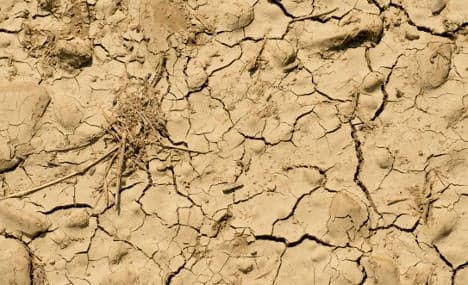Sweltering summer has climatologists sweating

Heat over 40 degrees, weeks without rain, sudden storms and flash floods – in the summer of 2015 Germany experienced all these things. Are these extremes set to become the norm?
“It fits the description [of global warming],” says Peter Hoffmann from Potsdam's Institute for Climate Research (PIK).
And the weather could become more intense meaning more heat waves and an increase in sudden localized storms.
In the future we can expect more days without rain and and then extreme downpours in a short time span. says Hoffmann. “We should prepare for both extremes.”
Wine growers in Rheingau, Hesse - famous for its fine Rieslings - have monitored the increase in temperatures for years. Their vines are budding earlier and the harvest in autumn is beginning sooner, as records covering several decades at the Wine Growing Office in Eltville show.
According to these records, vines now start budding ten days earlier than 60 years ago, while the harvest begins three weeks earlier than in the 1950s.
At the same time, summers in Rheingau are becoming ever drier. That puts stress on the vines, affecting their numbers and the quality of the grapes.
Drought hits Germany's green spaces
Central Germany has been particularly affected by the drought this summer, the German Weather Service (DWD) reports. In south Hesse, North Bavaria and Saxony the ground is drier than its has been for 50 years. In these regions the top 30-60 centimetres of soil have been completely dried out.
The situation is especially desperate in the Rhein-Main region. Green areas are parched and trees have dropped their leaves and needles in the middle of the summer.
“At the start of August many trees had already starting behaving as if it were autumn,” said Michael Gerst, head of forestry for the Hesse forest region.
Normally the leaves change colour from inside out, but this year the opposite happened, “a sign of the stress caused by lack of hydration,” said Gerst.
Some trees have even died as a result – every third sapling planted this year is in danger, Gerst warned.
According to Hoffmann of PIK, as the macro weather situation changes Germany will experience fewer west winds – the weather front unloved by many which brings cool weather and showers.
This summer several fronts came in from the southwest, bringing hot, dry air from the Sahara in northern Africa. And twice new record temperatures of 40.3 centigrade were recorded in Kitzingen in Bavaria.
“This situation will become more common,” said Hoffmann.
Over the whole year the amount of rainfall has so far remained comparable with previous years, but how it rains has changed.
Hot air can draw water out of the ground say meteorologists, but this water is full of energy. This results in storms and the heavy downpours which the DWD has regularly warned of this year.
Comments
See Also
“It fits the description [of global warming],” says Peter Hoffmann from Potsdam's Institute for Climate Research (PIK).
And the weather could become more intense meaning more heat waves and an increase in sudden localized storms.
In the future we can expect more days without rain and and then extreme downpours in a short time span. says Hoffmann. “We should prepare for both extremes.”
Wine growers in Rheingau, Hesse - famous for its fine Rieslings - have monitored the increase in temperatures for years. Their vines are budding earlier and the harvest in autumn is beginning sooner, as records covering several decades at the Wine Growing Office in Eltville show.
According to these records, vines now start budding ten days earlier than 60 years ago, while the harvest begins three weeks earlier than in the 1950s.
At the same time, summers in Rheingau are becoming ever drier. That puts stress on the vines, affecting their numbers and the quality of the grapes.
Drought hits Germany's green spaces
Central Germany has been particularly affected by the drought this summer, the German Weather Service (DWD) reports. In south Hesse, North Bavaria and Saxony the ground is drier than its has been for 50 years. In these regions the top 30-60 centimetres of soil have been completely dried out.
The situation is especially desperate in the Rhein-Main region. Green areas are parched and trees have dropped their leaves and needles in the middle of the summer.
“At the start of August many trees had already starting behaving as if it were autumn,” said Michael Gerst, head of forestry for the Hesse forest region.
Normally the leaves change colour from inside out, but this year the opposite happened, “a sign of the stress caused by lack of hydration,” said Gerst.
Some trees have even died as a result – every third sapling planted this year is in danger, Gerst warned.
According to Hoffmann of PIK, as the macro weather situation changes Germany will experience fewer west winds – the weather front unloved by many which brings cool weather and showers.
This summer several fronts came in from the southwest, bringing hot, dry air from the Sahara in northern Africa. And twice new record temperatures of 40.3 centigrade were recorded in Kitzingen in Bavaria.
“This situation will become more common,” said Hoffmann.
Over the whole year the amount of rainfall has so far remained comparable with previous years, but how it rains has changed.
Hot air can draw water out of the ground say meteorologists, but this water is full of energy. This results in storms and the heavy downpours which the DWD has regularly warned of this year.
Join the conversation in our comments section below. Share your own views and experience and if you have a question or suggestion for our journalists then email us at [email protected].
Please keep comments civil, constructive and on topic – and make sure to read our terms of use before getting involved.
Please log in here to leave a comment.